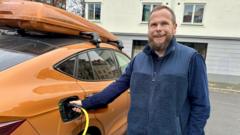Norway's commitment to electric vehicles has propelled it to lead the world in EV adoption, showcasing a robust support system that includes tax exemptions, easy access to charging stations, and public incentives, making the switch appealing for both consumers and the government.
Norway Races Ahead in Electric Vehicle Adoption

Norway Races Ahead in Electric Vehicle Adoption
With electric cars constituting nearly 90% of new vehicle sales, Norway is poised to become the first country to phase out fossil fuel cars entirely by 2025, setting an example for others.
Norway is on the brink of significant automotive transformation, emerging as the leading nation in electric vehicle (EV) adoption. In 2023, electric cars accounted for approximately 90% of all new vehicle sales, a trend that looks set to continue into 2024. With the aim of phasing out fossil fuel car sales by 2025, the country is positioned to set a precedent for other nations.
Ståle Fyen, a typical Norwegian motorist, represents this shift. He proudly drives an electric vehicle and reflects a mindset increasingly shared among the population. Almost one in three of Norway's cars is now electric, driven by extensive support measures initiated over the last three decades. "I think we’ve already made the transition for passenger cars," statements from Deputy Transport Minister Cecilie Knibe Kroglund indicate a strong commitment to zero-emission goals.
A vast public charging network has been instrumental in facilitating this shift, with over 27,000 public chargers strategically located across the country, providing reassuring access for EV drivers. This translates to a remarkable ratio of 447 chargers per 100,000 citizens, highlighting Norway's commitment to seamless travel for electric vehicles. In contrast, the UK, with a population 12 times greater, has only 73,699 chargers, manifesting a stark difference in infrastructure support.
Essential to Norway's success has been a comprehensive policy framework promoting electric vehicles while taxing fossil fuel alternatives heavily. This strategy, initiated in the early 1990s, has resulted in significant financial incentives for consumers, including tax exemptions and perks that encourage the use of electric cars.
Comparative statistics illustrate Norway's EV dominance; while the UK recorded a mere 20% of new car registrations as electric, and the US lagged at 8%, Norway enjoys nearly full adoption. The evolution of marketplace choices reflects these trends, with increasing consumer preference for EVs, overshadowing the allure of petrol and diesel options.
Notably, Norway remains one of the world's leading oil and gas producers, leveraging its energy wealth to promote its EV initiative. This fiscal strength affords the nation the flexibility to forgo tax revenues from fossil fuels while investing heavily in sustainable energy solutions. Renewable hydroelectric power, which constitutes 88% of the nation's electricity production, further supports this transition, marrying economic capability with environmental responsibility.
As the electric vehicle revolution unfolds in Norway, experts like Christina Bu of the Norwegian EV Association assert that other countries could feasibly replicate this model by adapting it to their unique circumstances. Ultimately, the Norwegian experience underscores how effective policy frameworks can foster a swift transition to cleaner energy within transportation, giving the rest of the world a potent example to follow.

















